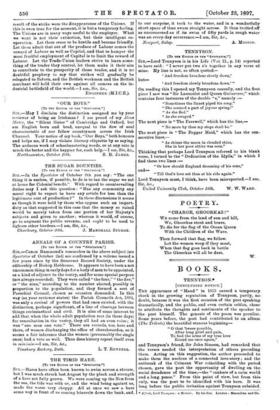ANNALS OF A COUNTRY PARISH.
ITO THE EDITOR OF THE "SPECTATOR."]
SIR,—Canon Hammond's researches in the above subject (see Spectator of October 2nd) are confirmed by a volume issued a few years since by the Somerset Record Society, under the editorship of Bishop Hobhouse. It appears to have been a not uncommon thing in early days for a body of men to be appointed, as a kind of adjunct to the vestry, and for some special purpose (not always recorded). They were called "the four," "the five," or "the nine," according to the number elected, possibly in proportion to the population, and they formed a sort of Parochial Council, chosen as occasion demanded. In this way (as your reviewer states) the Parish Councils Act, 1894., was only a revival of powers that had once existed, with the distinction, perhaps significant, of a line of cleavage between things ecclesiastical and civil. It is also of some interest to add that when the whole adult population met (in those days) for consultation in the vestry, they all had an even voice ; it was "one man one vote." There are records, too, here and there, of women discharging the office of churchwarden, so it seems a fair inference that the women (presumably the single ones) had a vote as welL Thus does history repeat itself even in minimis.—I am, Sir, &c.,










































 Previous page
Previous page